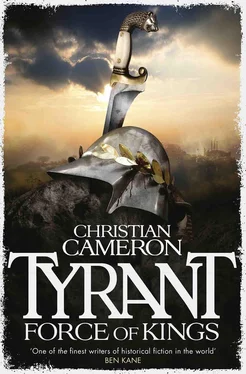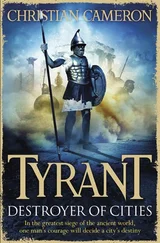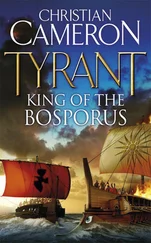Christian Cameron - Force of Kings
Здесь есть возможность читать онлайн «Christian Cameron - Force of Kings» весь текст электронной книги совершенно бесплатно (целиком полную версию без сокращений). В некоторых случаях можно слушать аудио, скачать через торрент в формате fb2 и присутствует краткое содержание. Год выпуска: 2014, Издательство: Orion Publishing Group, Жанр: Исторические приключения, на английском языке. Описание произведения, (предисловие) а так же отзывы посетителей доступны на портале библиотеки ЛибКат.
- Название:Force of Kings
- Автор:
- Издательство:Orion Publishing Group
- Жанр:
- Год:2014
- ISBN:нет данных
- Рейтинг книги:4 / 5. Голосов: 1
-
Избранное:Добавить в избранное
- Отзывы:
-
Ваша оценка:
- 80
- 1
- 2
- 3
- 4
- 5
Force of Kings: краткое содержание, описание и аннотация
Предлагаем к чтению аннотацию, описание, краткое содержание или предисловие (зависит от того, что написал сам автор книги «Force of Kings»). Если вы не нашли необходимую информацию о книге — напишите в комментариях, мы постараемся отыскать её.
Force of Kings — читать онлайн бесплатно полную книгу (весь текст) целиком
Ниже представлен текст книги, разбитый по страницам. Система сохранения места последней прочитанной страницы, позволяет с удобством читать онлайн бесплатно книгу «Force of Kings», без необходимости каждый раз заново искать на чём Вы остановились. Поставьте закладку, и сможете в любой момент перейти на страницу, на которой закончили чтение.
Интервал:
Закладка:
‘You’re not as funny as you think you are,’ Satyrus said. He tried to keep his tone light.
Both of them had been in love with Miriam — at the same time. To some remarkable degree, their friendship was based on that rivalry, and how they had risen above it. But Satyrus still avoided discussing Miriam with his friend, sometimes from a sense of propriety, and sometimes because he feared ridicule. Anaxagoras had — apparently — transferred his attentions to Satyrus’s own sister, Melitta.
‘I am,’ Anaxagoras said. ‘You’re just not in the mood to laugh. I can turn the knife on myself — your sister is out on the plains right now, with at least one former lover and ten men who want her to wife — every one of whom can ride a horse like the wind and shoot a bow.’
‘If my sister had wanted a Sakje, she’d have had one,’ Satyrus said.
‘That was rather my point,’ Anaxagoras said. ‘I know that I have nothing to fear.’ He looked at Satyrus. His tone, his expression, admitted that the exact opposite was the case, and he laughed ruefully.
‘At least you’ll see Miriam in Athens,’ Anaxagoras said.
‘If we ever get there,’ Satyrus allowed.
It was cooler on the palaestra, the sand beautiful between his toes, the sea breeze curling through the colonnade to cool his sweat-slicked skin.
He and Anaxagoras had wrestled, boxed, fought two throws of pankration, and were now facing each other with short swords made of wood and their chlamyses wrapped around their shield arms. Satyrus had the feeling one gets from heavy exercise, a few bruises, a body in the peak of condition.
Anaxagoras had had a year-long siege to make a swordsman of himself, and he was excellent — taught by the same tutor who had helped Satyrus to restore his muscles after a wasting disease. So they circled each other warily, and Anaxagoras, once an aggressive but clumsy swordsman, now bided his time, aware that, as the inferior fighter — although not by much — he needed to launch counter-strikes rather than trying to move in on Satyrus’s longer arms and greater experience.
Satyrus knew this as well, and he was tired — pleasantly tired, but with enough fatigue in his muscles to restrain him. He circled; sidestepped, and subsided again. For several long moments, both men were perfectly still.
‘This is the last touch. I want a massage,’ Satyrus said. It could be hard to be the king, all the time. Even Anaxagoras, who had the artist’s ability to be any man’s equal, deferred to him in matters of training. Anaxagoras would spar until he dropped of exhaustion — it was always left to Satyrus to call quits.
Anaxagoras nodded slightly.
He stepped to the left again, as Satyrus expected him to, and Satyrus launched a slow attack — so slow as to be almost languorous. His wrapped cloak flew off his arm like a live thing, fluttering out to snap, the cloak weight dragging the heavy cloth out flat for a fraction of a heartbeat.
Anaxagoras pivoted on both feet, rotating his hips to avoid the weight with his face, and his own cloaked arm snapped out to bat the incoming sword, but found no weapon, and dropped lower, seeking it.
Satyrus’s blow was so slow that Anaxagoras’s parry, blinded by the swirl of cloak, missed it entirely, and the wooden blade smacked him in the side of the neck — a trifle too hard. He dropped to one knee, his hand to his neck.
Satyrus was at his side, sword dropped. ‘Apollo! A thousand apologies, Anaxagoras!’
The musician shook his head. ‘It’s nothing. Or rather, it is a fitting accompaniment to my sense of humiliation. How, exactly, did you land that blow?’
Assured of his friend’s health, Satyrus was suffused with pride. ‘It is a timing blow. It would never work without the cloak — it simply baffles the opponent’s notions of the speed of the fight.’
‘Devastating!’ Anaxagoras said.
‘Not if your opponent strikes fast — expects the blow, cuts at the sword arm,’ Apollodorus commented from the colonnade.
‘Look who’s recovered from his wine!’ Anaxagoras said, clearly piqued that the other man had seen him hit so easily.
Satyrus smiled inwardly at the ease with which men — men who were friends and comrades — could nonetheless cause each other offence. Satyrus was almost never offended by Apollodorus and his abrasive commentary on all fields of martial endeavour — the man was a professional, and his comments were meant only as professional criticism, no more. But the small, sharp-featured man had never mastered the art of giving criticism.
‘Let’s fight a bout and see,’ Apollodorus said, coming onto the sand. He pulled his chlamys off and wrapped it around his arm, disclosing a body laced with scars the way barbarians wore tattoos. Satyrus had never counted them, but he expected that his captain of marines had at least a hundred scars, most of them on his forearms and lower legs, a few on his back, and one that indented his neck, where his heavy shoulder muscle met his collarbone, and ran, red, shiny and deep, across his chest to his hip.
Apollodorus was a small man, but neatly built, heavily muscled, and fast. Satyrus tossed him his practice sword, and he and Anaxagoras began to circle.
Anaxagoras remained cautious and defensive, which Satyrus read as a sign of anger. In combat, Anaxagoras was dangerously aggressive, almost as if he knew the hour of his fate and had little care until that time. Apollodorus was usually the cautious fighter — a man only survives as much combat as Apollodorus had seen by virtue of some caution. But today he was the one committed to attack.
‘We are at the end of our workout,’ Satyrus said. ‘Wine-bibbers have to take the consequences of their excess.’
‘You’re next,’ Apollodorus said. As he spoke, his chlamys-arm snapped out in a feint, and his sword followed, a fraction of a heartbeat behind.
As fast as thought, Anaxagoras parried, the two swords clicking together hard.
But Apollodorus didn’t maintain the pressure. Instead, he dropped his weapon, stepped in, and grappled, his now free sword-hand seizing Anaxagoras’s wrist expertly, his cloak over the musician’s head.
Anaxagoras raised his left hand, indicating he’d lost, and Apollodorus unwrapped him from the folds of his cloak. ‘I needed last night,’ he said. The words held no apology, but the tone did.
‘I have been thoroughly put in my place,’ Anaxagoras said. ‘I’ll go back to the lyre and leave the sword to you two.’
‘Nonsense,’ Apollodorus said. ‘If you could beat me, I’d be a pretty poor specimen. I’ve fought for twenty years — and practised ten years before that.’ He nodded to Satyrus. ‘Your turn.’
Satyrus caught the sword that Anaxagoras tossed him — and found that Apollodorus was on him immediately, sword and cloak weaving like a pair of dancers. He reacted without thought, ducking, backing — got his cloak on the other man’s sword and tried for a seizure and missed, tried snapping a kick to the other man’s shin and connected — a glancing blow, but it put him in the pattern and Apollodorus fell back, and Satyrus snapped his chlamys, his sword hidden behind it, and stepped back himself to breathe — and Apollodorus’s sword hit his wrist hard enough to cause him to drop his own sword.
Anaxagoras clapped his hands together. There were other men standing under the colonnade and they applauded as well. ‘Splendid!’ called a younger man — Satyrus couldn’t remember his name, but the man had been an Ephebe during the siege. He was still thin. Satyrus wondered if any of them would return to their full weight after a year on starvation rations.
He rubbed his wrist and smiled at Apollodorus. ‘You are still the master,’ he said.
Читать дальшеИнтервал:
Закладка:
Похожие книги на «Force of Kings»
Представляем Вашему вниманию похожие книги на «Force of Kings» списком для выбора. Мы отобрали схожую по названию и смыслу литературу в надежде предоставить читателям больше вариантов отыскать новые, интересные, ещё непрочитанные произведения.
Обсуждение, отзывы о книге «Force of Kings» и просто собственные мнения читателей. Оставьте ваши комментарии, напишите, что Вы думаете о произведении, его смысле или главных героях. Укажите что конкретно понравилось, а что нет, и почему Вы так считаете.












